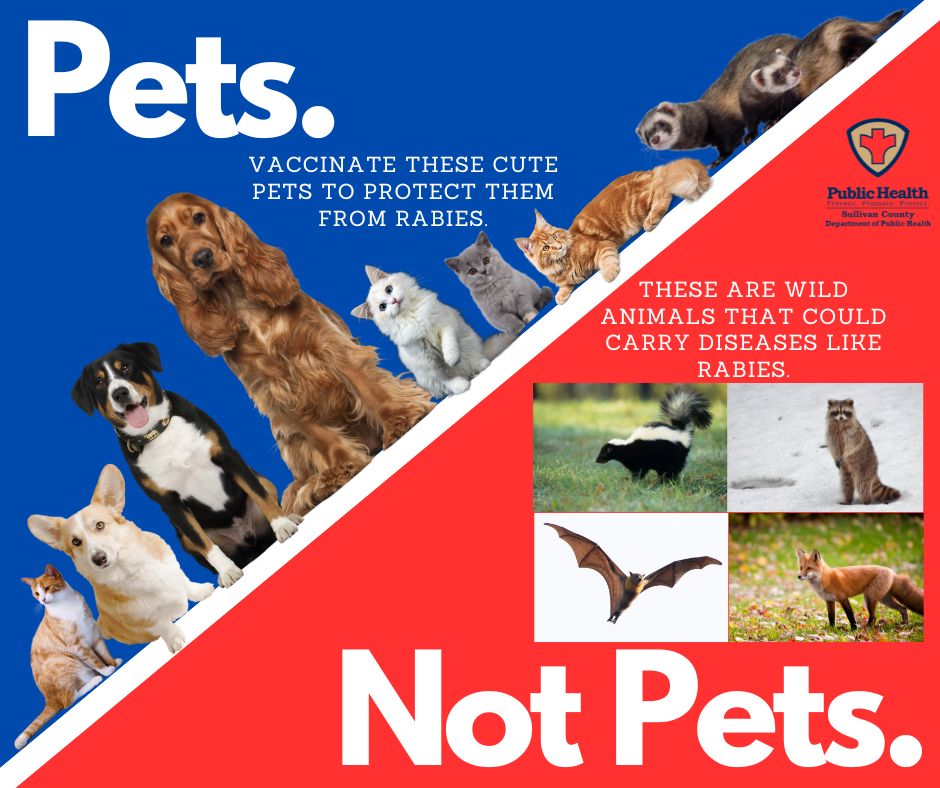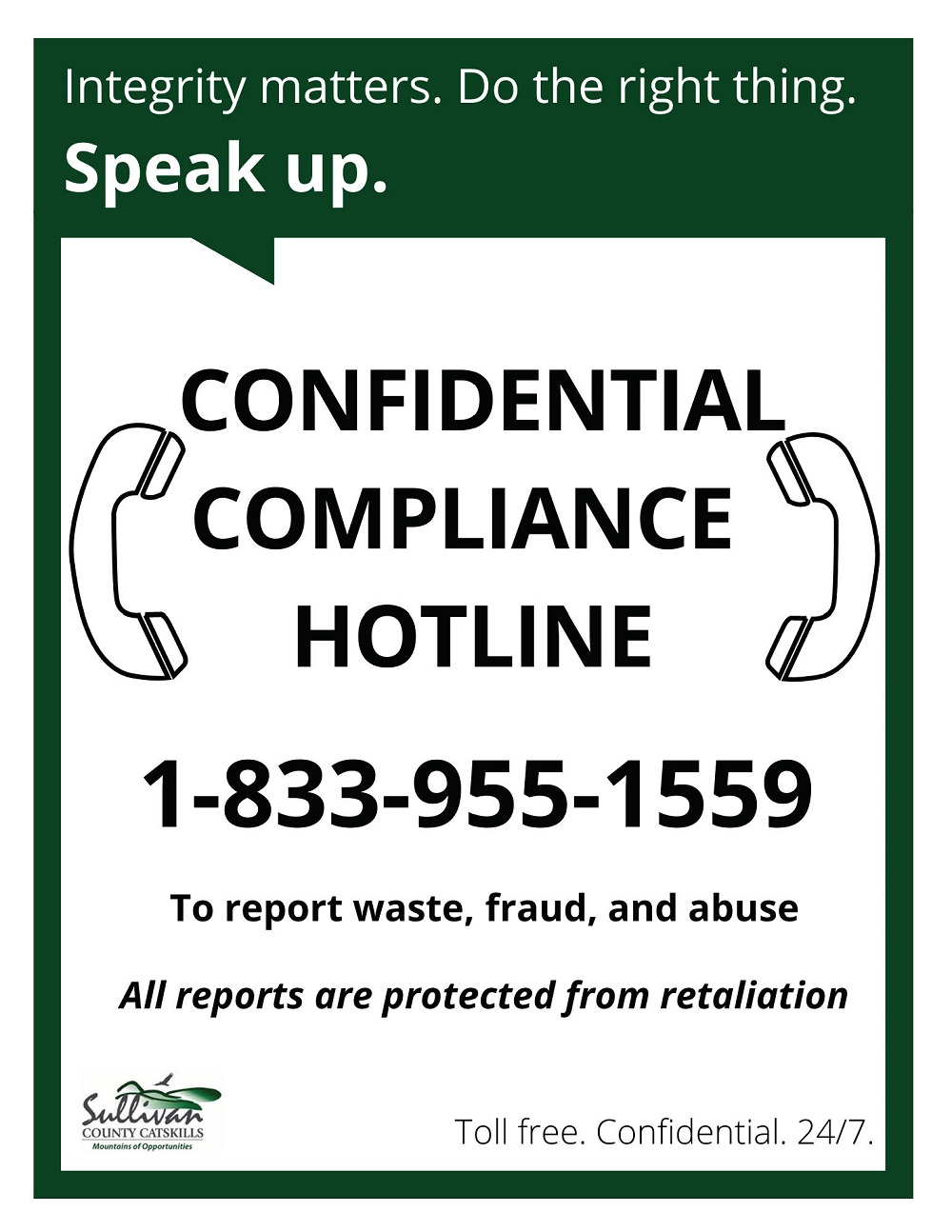To find Licensed Wildlife Rehabilitators in Sullivan County, please follow this link:
NYS DEC Find a Wildlife Rehabilitator Near You
Rabies Vaccination Clinics
Sullivan County Department of Public Health offers at least four free rabies vaccination clinics throughout the year for Sullivan County residents. All pets must be at least 3 months old and be in a carrier or on a leash. Aggressive dogs should be muzzled to avoid any biting incidents.

Rabies
Q1. Isn't the rabies threat over in Sullivan County?
Answer: NO. Rabies will remain in Sullivan County. Your best protection against rabies is a well vaccinated pet community. Raccoons, skunks, and foxes are the animals most often infected with rabies in Sullivan County. If you see a wild animal, or a domestic animal acting strangely, (too tame OR too aggressive) keep your distance and keep your pets and children inside. If you are being threatened, call your local police or sheriff's department. Call Sullivan County Public Health with any questions, day or night at (845) 292-5910.
Q2. How often does my dog or cat need a rabies shot?
Answer: The first time he or she gets a shot, your pet must be at least 3 months old. The first rabies shot must be repeated in 1 year. Thereafter, if your vet is using 3 year vaccine, your pet will need to be vaccinated every 3 years. A pet whose rabies booster has waited more than 3 years is considered UNVACCINATED. Some vets prefer to vaccinate every year with a one year vaccine. Check with your veterinarian.
Q3. A bat was flying around in my son's bedroom while he was sleeping. What should I do?
Answer: 96% of bats tested in New York State are not rabid. If you can catch the bat, do so. It must be tested . If the bat has escaped, since it can't be tested for rabies, the recommendation of the New York State Department of Health is to vaccinate your son because he was asleep and might have been bitten in his sleep. Call Public Health Services for information on how to proceed.
Q4. My dog got into a fight with a wild animal, and the animal ran off. What do I do?
Answer: Get a rabies booster for your dog within 5 days. If your dog is unvaccinated, he or she may have to be confined in a special enclosure for 6 months, or destroyed. Call Public Health Services to receive direction. KEEP YOUR PETS VACCINATED AGAINST RABIES!
Measles - Everything You Need to Know
MONKEYPOX (MPox)
If you are interested in receiving the JYNNEOS intradermal vaccine for mpox, you may call Public Health at 845-292-5910 for help finding a provider.
What is Monkeypox (MPox)?
Monkeypox is a rare, viral infection that does not usually cause serious illness. However, it can result in hospitalization or death. That's why health officials in New York, the U.S., and around the world are monitoring cases of monkeypox in areas that do not usually report monkeypox infections, including in New York State.
While New Yorkers should not be alarmed, everyone should stay informed about monkeypox. This means understanding the symptoms, how it spreads, and what to do if you are exposed.
Who is at risk of contracting monkeypox (MPox)?
Monkeypox spreads through close, physical contact between people. This means anyone can get monkeypox. However, based on the current outbreak, certain populations are being affected by monkeypox more than others, including men who have sex with men (MSM).
Based on previous outbreaks of monkeypox around the world, some groups may also be at heightened risk for severe outcomes if they contract monkeypox. This includes people with weakened immune systems, elderly New Yorkers, young children under 8 years of age, and pregnant people.
Are there treatments available?
Antiviral medications exist to treat monkeypox, which may be appropriate for some people. Vaccines exist that can help reduce the chance and severity of infection in those who have been exposed.
To track the prevalence of monkeypox across New York State, visit https://health.ny.gov/diseases/communicable/zoonoses/monkeypox/index.htm
POLIO
What is polio?
Polio is a disease that is caused by a virus (poliovirus). Polio can cause a range of symptoms. Many people with polio will have no apparent symptoms, while others may have mild symptoms such as sore throat and fever or vomiting, that are common to any viral illness. A small percentage of people with polio can develop severe symptoms that include meningitis with temporary stiffness of the back, neck, and/or legs, and some may develop permanent weakness of legs, arms, or both.
How is polio transmitted?
Poliovirus is very contagious and spreads through person-to-person contact. It spreads through contact with the stool (poop) of an infected person or droplets from a sneeze or cough. If you get stool or droplets from an infected person on your hands and you touch your mouth, you can get infected. Also, if your child puts objects, like toys, that have stool or droplets on them into their mouth, they can get infected.
An infected person may spread the virus to others immediately before and usually 1 to 2 weeks after developing symptoms. The virus may live in an infected person’s intestines for many weeks. They can contaminate food and water when they touch it with unwashed hands.
Is there a cure for polio?
There is no cure for polio, but it can be prevented with safe and effective vaccination. A series of vaccinations consists of three properly spaced doses, usually at 2 months, 4 months, and 6-18 months. A booster dose may be given at 4-6 years of age. When all recommended doses of polio vaccine are completed, 99% of people have immunity to polio.
How can I protect myself and my family from polio?
The best way to keep our communities polio-free is to maintain high immunity across the population through vaccination.
All New Yorkers can protect themselves against polio through safe and effective vaccination. Long included on CDC's child and adolescent immunization schedule and NYSDOH's required school immunizations list, all school-age New Yorkers must be vaccinated before they start school. This means many New Yorkers should already be fully and safely vaccinated. If you or your child are not yet vaccinated, now is the time to reach out to a healthcare provider or your local county health department to get vaccinated.
In addition to vaccination, access to clean water, good hand hygiene habits, modern sewage systems and wastewater management further prevent germs, including viruses like poliovirus, from spreading.
Do I need to get an additional vaccine?
For those who are fully vaccinated there is currently no need to get an additional booster dose. If you are unvaccinated, or unsure of your vaccination status, please contact your health care provider.
What is wastewater surveillance?
Wastewater data can help us better understand what communities might be at the highest risk and increase vaccination efforts for those most vulnerable. Wastewater samples are untreated wastewater taken from waste treatment plants; this does not mean that poliovirus is being found in open drains or potable water. Wastewater surveillance is an active, ongoing effort that NYSDOH is leading in partnership with local, national, and global public health authorities.
Where can I get more information?
For more information on polio and wastewater surveillance, visit:


